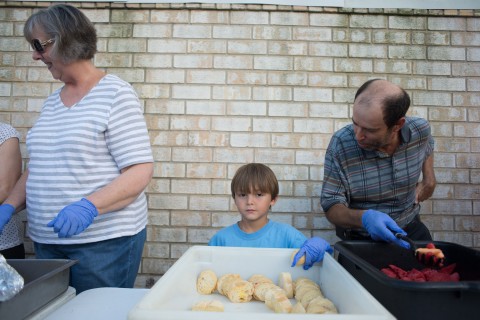The Care Effect ministries of First Baptist New Orleans are a product of and a manifestation of the gospel of Jesus Christ. But they are not an illustration of the social gospel.
These ministries are an effort to mimic the life and work of Jesus of Nazareth who was powerful in “word and deed” (Luke 24:19) and to follow the instructions of Scripture in devoting ourselves to a life of “love and good deeds” (Hebrews 10:24).
Many Southern Baptist churches—and evangelical congregations in general—have abandoned any serious effort to address obvious needs among widows, orphans, and the poor. The commands of Scripture regarding the needy have been viewed as incumbent on the individual Christian rather than the church as a body. The churches have organized themselves for evangelism and discipleship around the Great Commission (Matthew 28:180-20) rather than love of neighbor as ordered in the Great Commandment (Matthew 22:36-40).
Southern Baptist pastors are taught that the Sunday School is the church organized for outreach and ministry:
“Just as every successful coach has a game plan, successful churches have systematic game plans to fulfill the Great Commission. The 21st century church need not reinvent the methodological wheel to look for an organizational strategy. Sunday School is not just an organization of the church. Sunday School is the church organized to fulfill the Great Commission” (http://www.lifeway.com/Article/Game-plan-organize-church-through-sunday-school).
This is a core teaching among Southern Baptists. Our church continues to reach people through what we call “small groups” that are really Sunday School with a new name. I continue to be a strong advocate of such work in our churches.
But not at the expense of the Great Commandment. We should include in our definition of a “successful” church some measurable demonstration of loving our neighbor.
Where is the plan for our Southern Baptist churches to be organized to accomplish the Great Commandment? How will such a plan become part of the DNA of our churches?
Our preference for organizing to do the Great Commission rather than the Great Commandment looks and sounds self-serving to many people both within and outside of the churches. Absent the gospel proclamation embodied in deeds of compassion, we seem to be vigorously recruiting new members because we need more bodies and money to count.
This lopsided presentation of the gospel and of the Savior—a Great Commission without a Great Commandment—is undercutting evangelism and discipleship. It doesn’t look or sound true because it is not true to Jesus himself or the gospel he came to incarnate and proclaim.
We have a Savior whose works of compassion are beyond famous. Loving deeds permeate the popular perceptions of Jesus because they permeated the person and work of Jesus. These deeds of compassion are imbedded in the languages of the earth through references to the Good Samaritan, the lost sheep, the prodigal son, the Beatitudes, etc. No presentation of the Savior is complete without them.
The church is preaching a misshapen gospel, an anemic gospel, if it is not incarnating the love of God through love of neighbor. The Care Effect is our effort at First Baptist New Orleans to proclaim the full-orbed gospel of Christ with both words and deeds.
Words are not enough. Absent the deeds, they will not satisfy this new generation no matter how powerful the apologetic may be. Words have never been enough. That is why God became flesh.
Our greatest apologetic is the incarnation of God’s love through deeds of compassion. We cannot uncouple words from deeds. It is an artificial, unhelpful, and finally detrimental distinction.
Loving neighbors has always been costly in time and resources. Some pastors insist that churches cannot afford to do such work, that the needs are too great. Loving neighbors, however, has always been a selective process. We do the work that God puts in our path and in our hearts, whatever the cost. God will show us our particular assignment if we will ask him.
We need a theory and practice of church and Sunday School that includes the Great Commandment. Fulfilling the Great Commandment should be in our budget, in our staff assignments, and on our weekly church calendar. Our Southern Baptist churches need to be famous for love and good deeds.
Then we will look and sound much more like our winsome, wonderful Savior.



Comment(1)
Rev. Thomas Lowrie says
September 24, 2014 at 1:53 pmAMEN Faith without works is DEAD